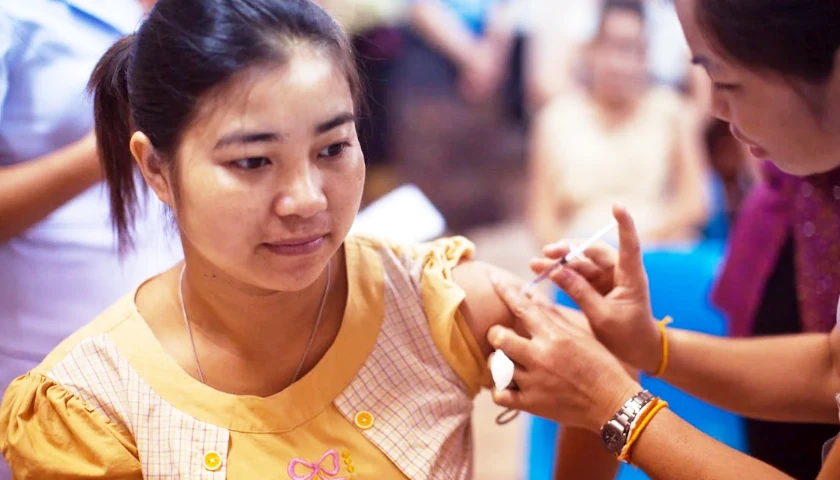Live from Music Row Wednesday morning on The Tennessee Star Report with Michael Patrick Leahy – broadcast on Nashville’s Talk Radio 98.3 and 1510 WLAC weekdays from 5:00 a.m. to 8:00 a.m. – host Leahy welcomed Independent Women’s Forum Senior Policy Analyst and a contributing writer to The Federalist Kelsey Bolsar to the newsmakers line to discuss employer vaccine mandates, safety, and pregnancy.
Leahy: On the newsmaker line. Kelsey Bolsar, who writes for The Federalist and is a senior policy analyst at the Independent Women’s Forum. She has an article out called The Cost of Vaccine Mandates for Pregnant Women. Welcome, Kelsey.
Bolsar: Good morning. Thanks for having me.
Leahy: I understand that you are a graduate a Little Ivy College called Lafayette College in Easton Pennsylvania. I have been to Easton Pennsylvania a great place.
Bolsar: Absolutely. And it’s actually experiencing quite a boom right now, which is great for the surrounding area in addition to the college.
Leahy: Why is it experiencing a boom there, by the way?
Bolsar: Oh, it’s pandemic related. Individuals who used to live in New York City year-round now have more flexibility in their workplace and are looking to move to surrounding areas that might be a bit of drive but nothing crazy from New York and Easton Pennsylvania is one of them.
Leahy: Did you have fun attending Lafayette? Was it a good program?
Bolsar: Absolutely. Lafayette College is the smallest, Division one school. I was a Division one athlete for part of my college career and made a lot of close friends, had fun competing, and learned a lot.
But of course, it is one of these small liberal arts institutions that do very much lean to the left. So I’m grateful that I did come to my senses and stayed true to myself while I was there.
Leahy: I got to hear this. I did not know that it was a Division one school. For all sports is just for a few sports?
Bolsar: All sports.
Leahy: Wow. And what sport did you compete?
Bolsar: I played lacrosse.
Leahy: Oh! My girls play lacrosse. And I’ll tell you this, I never played lacrosse in my life. But when my daughter, who’s now in her early thirties, was in high school, she said, Dad, I want to play lacrosse.
We started a lacrosse team and I coached them. And by the way, if you’re a man and you played men’s sports, it’s probably not a good idea for your first time to coach a girls team, because it’s a whole different attitude, isn’t it?
Bolsar: It is. It’s a great sport, though very popular on the east coast, still picking up steam in other states across the country, but it’s very competitive on the east coast. And competing at one of the smallest division one schools in the country certainly presented its own challenges.
But college athletics is something I recommend to anybody whose interested because it teaches you life lessons you can use both of on and off the field.
Leahy: Absolutely. Well, you’ve written about one life lesson, I suppose the cost of vaccine mandates for pregnant women. Tell us what those costs are. And why are you writing about this?
Bolsar: Absolutely. I actually wrote about this because of a personal experience. I initially was hesitant to come out with my story. I am very blessed to be expecting our second child later this year.
And I was one of the many women facing a difficult decision about whether to get vaccinated as a high-risk individual who was expecting. Of course, being pregnant puts you in that high-risk boat for COVID-19.
Unlike before, I was hopeful that I was one of these young and healthy individuals that wouldn’t face a severe case. But now I had more side effects to worry about. But also, we have no data about vaccines on women from the first trimester who have actually successfully given birth because, of course, this vaccine didn’t become available until December earliest.
And so anybody who got the vaccine who was expecting during their first trimester likely has not completed their pregnancy full term and given birth, which is kind of scary regarding the number of unknowns in terms of what these vaccines could do to the development of the child.
I want to be clear that every study that has been released thus far looks really good for pregnant women getting the vaccine. Researchers have not raised any medical concerns about women getting it at any point in their pregnancy.
But, of course, with so many unknowns with a vaccine that is still in the experimental stage, this is a very personal decision for women to make who are expecting and other Americans who have high-risk conditions that put them in the boat where they might not know exactly what could happen both short and long term if they get this vaccine.
And so in light of this being a personal decision, I was looking at the national rhetoric surrounding vaccine mandates and vaccine passports and I found it very ugly and dismissive of the very legitimate concerns and serious ways Americans are thinking through the decision of whether to get vaccinated and when.
Many of us are nothing but grateful for this medical miracle, we are far from any of the sort of anti-vaxxers that you hear being shamed in the national media. Many of them on the left recited a few remarks made on The View.
And I kind of raised the question, the point of so many young, healthy Americans getting vaccinated right now is to protect the more vulnerable who do face more difficult decisions about whether to get vaccinated.
Why don’t our policies and our rhetoric reflect that? Vaccine mandates requiring them to go back to work, but women specifically in a very difficult position if they are expecting or if they are trying to get pregnant and have questions about the vaccine long term.
And it kind of forces them to reveal to their bosses very private fertility information that should remain private. No woman should be pressured or forced into revealing their fertility status before they are ready.
And many of these policies just push women up against the wall and set this dangerous precedent that we have no choice but to get vaccinated. And until we have irrefutable data in terms of vaccines and pregnancy, this does need to remain a choice.
And I can tell you, as someone who is expecting, it is a very difficult choice that women are thinking very seriously through regarding the pros and cons of getting vaccinated or not.
Leahy: So walk us through your own personal decision. You have one child. Are you currently expecting another child?
Bolsar: Yes. And I am only just out of my first trimester. And so for the past few weeks, while I’ve been watching the rhetoric and these policies be handed down, I was in that boat where there’s not just a little bit of data on successful outcomes in terms of women who are vaccinated later and their pregnancy and successfully given birth.
There is no data. And that’s a very difficult position to be in. And I can tell you I am getting mixed recommendations from doctors. Some of them tell me to get it at all cost, while others told me, don’t.
Most definitely hold off, at least until you’re in the first trimester and risk assess after that. So there is not a clear consensus in the medical community. And it’s important that that the lack of that consensus is better reflected on the national stage in terms of our policies.
I do believe that women who are expecting are in that group where if there are vaccine mandates, they would be able to get a medical exemption. But once again, this is forcing women to reveal their fertility status and very private information early on in their pregnancy before some are ready.
I do know there’s a number of individuals out there that are especially prominent in the Black community where women are concerned about the long-term implications of the vaccine on their fertility.
And this does not mean they’re anti-vaxxers. All this means is they want to wait a bit longer for more information to be given to them that reassures them that this vaccine will have no negative implications for their fertility.
Leahy: Kelsey Bolsar, that’s a very articulate explanation of the concerns that pregnant women have about whether or not to take the COVID-19 vaccine. We certainly wish you well with your pregnancy and look forward to more of your reporting. Kelsey, thanks so much for joining us today on The Tennessee Star Report.
Bolsar: Thank you.
Listen to the full second hour here:
– – –
Tune in weekdays from 5:00 – 8:00 a.m. to the Tennessee Star Report with Michael Patrick Leahy on Talk Radio 98.3 FM WLAC 1510. Listen online at iHeart Radio.





